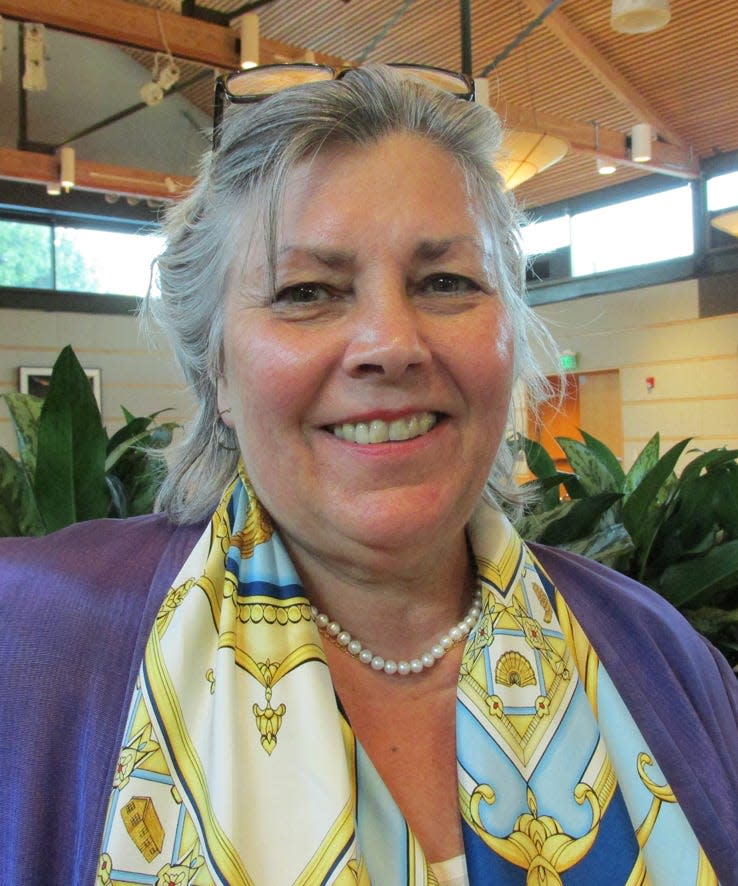Opinion: 'Glocal' diplomacy: A commencement call to practice citizen diplomacy

This column is an excerpted version of Liz Colton's Commencement 2022 Speech at Warren Wilson College.
This whole world is now “glocal.” What happens locally can resonate globally. What happens at the global level impacts local levels. Our whole world now, Earth, its oceans, outer space and all peoples are interrelated. Global and local are intertwined and are glocal. Today I am going to encourage, to entrust every one of you, regardless of your future life’s paths, to practice “glocal diplomacy” ― to serve as citizen-diplomats, each in your own way, in whatever your careers, to promote your idealistic dreams to improve the world, toward peace.
All of us here hail you now as graduates whose university time was full of once unimaginable, life-molding experiences, shocks, challenges, joys, now memories — of a global pandemic, national racial attacks, public exhibitions of hatred, national divisiveness, a new war in Europe, new cultural revolutions countered by reactive, sometimes violent forces. We are always living in and molded by our history. You all have an indelible, shared history.
From here you will go out into the world, everywhere, in all directions and into various future experiences. Each of you will live different lives, and yet you will be forever connected by your communal time in this shared era. What can I suggest to you all as a practice in living no matter what career, whether close to home or around the world or into outer space?
More:Opinion: Barbara Walters: Special memories of a mentor and broadcast legend
Diplomacy. I believe diplomacy is among the greatest and most important of all human activities. What is diplomacy? There are many definitions. The broad definition of diplomacy I prefer is diplomacy includes all activity aimed to build peaceful relations between groups of people, to resolve conflict, to work for peace everywhere.
At the beginning, when we became human, I believe diplomacy and diplomatic activities were among the first kind of behavior that made us human. One group reached out to another group to establish peaceful relations. That was diplomacy, the beginning of diplomacy with the beginning of human beings. They sent messengers with greetings, orators-speakers, dancers or athletes to perform, invited other groups to eat each other’s food in shared meals, sent gifts, ultimately to marry, to reach agreements, to establish peace treaties. Diplomacy built humanity.
Now in this new century, this interconnected world again needs “glocal diplomacy.” This is a concept I’ve taught and written about worldwide. Everywhere we need diplomacy that is local, reaching out locally to build positive relations among people, to take local diplomacy to go beyond, and global diplomacy that goes locally and back from the local out to the wider world ― “glocal diplomacy” working for peace in all directions.
As an international journalist and also as a diplomat for both the U.N. and the U.S., I’ve covered diplomacy, wars and peace. I saw that it’s easier to descend into war. Diplomacy is much more difficult. Peace is joyful. Diplomacy is not just for professionals who work for a nation-state or for an international organization. Citizen Diplomacy is the face of global and glocal diplomacy. Some citizen-diplomats who started locally have been awarded the Nobel Peace Prize. We are all world citizens, and we can all practice “glocal” or citizen-diplomacy. Each of you with your ideals in your own ways can become a Citizen-Diplomat promoting peace in the world.
More:Opinion: Asheville church houses memories of once-thriving Black neighborhood
More:Opinion: Nuclear weapons need to be reduced and eventually eliminated
Like you, my university years and immediately afterward, were punctuated by life-molding memories. Our nation’s president was assassinated; then the nation’s greatest civil rights leader and another national leader were assassinated-murdered; later another president was pushed to resign by exposure of his crimes.
This country’s citizens were deeply divided, pitted completely against each other on issues in which many of us were actively involved-civil rights movement, antiwar against pro-military during a war far away that divided us at home, basic politics, beginning of a new women’s liberation movement, the Peace Corps, the early environmental movement, a socio-cultural revolution that radically changed traditional mores, cities were burning, students were gunned down by national guard soldiers. Yet radical changes were made then and still now.
Now you are at your new commencement, your new beginning. You believe, as we all here do, that you and we all can build unimaginably better worlds. You will serve throughout your life. You are going out into a new world to face challenges and to make positive differences wherever you are.
You can be citizen-diplomats in the best sense of the idea of working idealistically and realistically in “glocal-diplomacy” to bring peace locally and globally.
Elizabeth (Liz) Colton, author, diplomat, teacher and Emmy Award winning journalist, currently teaches diplomacy and the media worldwide for UNITAR. She serves as Diplomat and Journalist in Residence at Warren Wilson College.
This article originally appeared on Asheville Citizen Times: Liz Colton calls for 'glocal diplomacy,' practice of citizen diplomacy

